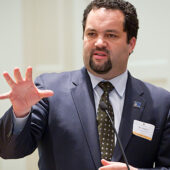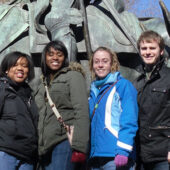NAACP leader addresses school issues
 Ben Jealous, the national president of the NAACP, said Monday night in a speech at Wake Forest that his organization is committed to fighting school re-segregation and disparities in the numbers of black and white students expelled from schools in North Carolina.
Ben Jealous, the national president of the NAACP, said Monday night in a speech at Wake Forest that his organization is committed to fighting school re-segregation and disparities in the numbers of black and white students expelled from schools in North Carolina.Categories: Happening at Wake

 The Schools of Business full-time MBA program placed 11th in the nation in job placement, according to the U.S. News & World Report rankings released March 15. Within three months of graduation, 92 percent of the 2010 full-time MBA graduates secured employment. In the overall program rankings, the Schools of Business again placed in the top 50.
The Schools of Business full-time MBA program placed 11th in the nation in job placement, according to the U.S. News & World Report rankings released March 15. Within three months of graduation, 92 percent of the 2010 full-time MBA graduates secured employment. In the overall program rankings, the Schools of Business again placed in the top 50.  The importance of the humanities to a liberal arts education will be on full display during a two-day symposium marking the official launch of the Wake Forest Humanities Institute on Friday and Saturday. Two nationally known advocates for the humanities — historian Edward Ayers and author Stanley Fish -- will discuss “The Humanities in the 21st Century.”
The importance of the humanities to a liberal arts education will be on full display during a two-day symposium marking the official launch of the Wake Forest Humanities Institute on Friday and Saturday. Two nationally known advocates for the humanities — historian Edward Ayers and author Stanley Fish -- will discuss “The Humanities in the 21st Century.” With numerous reports documenting poorer quality of health care and outcomes for racial and ethnic minorities, several prominent experts will take on the issue of disparities in health care during a symposium on campus Wednesday.
With numerous reports documenting poorer quality of health care and outcomes for racial and ethnic minorities, several prominent experts will take on the issue of disparities in health care during a symposium on campus Wednesday. Sixty percent of Wake Forest students study abroad before graduation. Immersed in Spanish history and culture, junior Jenny Reed is spending this semester in Salamanca, Spain — one of the many programs available through the Center for International Studies.
Sixty percent of Wake Forest students study abroad before graduation. Immersed in Spanish history and culture, junior Jenny Reed is spending this semester in Salamanca, Spain — one of the many programs available through the Center for International Studies. What do we gain and what do we give up with the latest technological tools? From the loss of privacy to the advantages of using digital apps, Professor of Communication Ananda Mitra shares ideas about how to cope with the complex challenges caused by the widespread adoption of digital technology.
What do we gain and what do we give up with the latest technological tools? From the loss of privacy to the advantages of using digital apps, Professor of Communication Ananda Mitra shares ideas about how to cope with the complex challenges caused by the widespread adoption of digital technology. Walking, wandering and Wake Forest’s study-abroad opportunities open a window on the world for writer Susannah Rosenblatt (’03). Read more in Wake Forest Magazine.
Walking, wandering and Wake Forest’s study-abroad opportunities open a window on the world for writer Susannah Rosenblatt (’03). Read more in Wake Forest Magazine. Wake Forest is one of six schools to qualify three teams to the National Debate Tournament, which will be held later this month in Dallas. Juniors Michael Carlotti and Andrew McCarty led the way by finishing third at the district tournament.
Wake Forest is one of six schools to qualify three teams to the National Debate Tournament, which will be held later this month in Dallas. Juniors Michael Carlotti and Andrew McCarty led the way by finishing third at the district tournament. To better understand barriers to Fair Trade and the limitations of free trade, Wake Forest anthropology and business students are visiting Chiapas, Mexico, during spring break. Learn more about the class, “Free Trade, Fair Trade: Independent Entrepreneurs in the Global Market” and follow their adventures in the field by visiting their blog.
To better understand barriers to Fair Trade and the limitations of free trade, Wake Forest anthropology and business students are visiting Chiapas, Mexico, during spring break. Learn more about the class, “Free Trade, Fair Trade: Independent Entrepreneurs in the Global Market” and follow their adventures in the field by visiting their blog.
 The five stages of grief -- denial, anger, bargaining, depression and acceptance -- are a commonly accepted and comforting road map to overcoming grief. But the stages were never intended to be a uniform way of dealing with the death of a loved one, says Professor of Counseling Ed Shaw.
The five stages of grief -- denial, anger, bargaining, depression and acceptance -- are a commonly accepted and comforting road map to overcoming grief. But the stages were never intended to be a uniform way of dealing with the death of a loved one, says Professor of Counseling Ed Shaw.